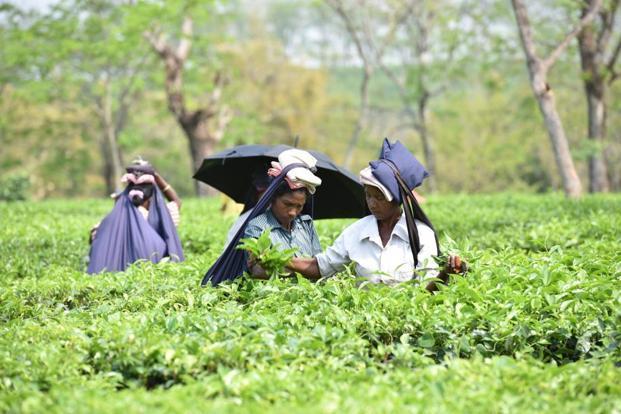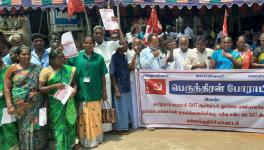Despite BJP’s Poll Promise, Assam Tea Workers Still Await Wage Revision

Representational image. | Image Courtesy: Livemint
Kolkata: For around half a million tea plantation workers in the organised sector in Assam, the main issue is how long they have to survive with interim relief. These tea workers, which include 60% female and 40% male workers, are waiting for the Assam government to come to terms with the wage revision pending before the minimum wage committee. This marks a departure from the wage revision being a bilateral exercise that it used to be for many years.
As the Assam tea plantation workers contend with the uncertainty, what has made the pitch even more difficult for them is that the organised sector of the producers has to reckon with non-remunerative price realisation in a situation that presents a paradox. On one hand, there is increasing production of relatively cheap tea in the unorganised sector, while on the other hand, the cost of production of quality tea in the organised sector is increasing. This accompanied with overall domestic tea consumption not appreciating the level of demand is leading to a fall in the prices.
Exports are traditionally dependent upon global demand and consumption trends. Only in recent years, the traditional level of 200-220 million kg has been exceeded by some 8% because of promotional efforts by the industry with support of the Centre’s Department of Commerce. Some success has been achieved in the Iran market. But, this satisfaction is now proving to be short-lived with Pakistan retaliating with a trade ban against India’s decision to withdraw the special status that Jammu & Kashmir had enjoyed under erstwhile Articles 370 and 35 A of the Constitution. In fact, prospects of tea exports had already become somewhat uncertain following India’s Balakot air strike in reaction to the major terrorist attack in Jammu & Kashmir’s Pulwama.
Pakistan is an important market for India’s strong liquor CTC tea and its imports from India last year stood at 15.83 million kg (mkg), which was an improvement of 7.43% than 2017. This year, up to June, 5.08 mkg were exported, registering a decline of 31.16% from the exports a year ago.
Also read: Elections 2019: Upper Assam Tea Tribes Angry with BJP for Failing to Hike Daily Wage
The wage issue, interestingly, has got linked with the Lok Sabha election campaign of the Bharatiya Janata Party which had won a comfortable majority in the Assembly elections earlier and which fared to its satisfaction in the Lok Sabha elections.
During campaigns strategised by Himanta Biswa Sarma, Assam’s current finance minister, BJP promised to get the daily wage raised to Rs. 351 per worker from Rs 167 that a worker was entitled to under the last three-year wage agreement that had expired on December 31, 2017. As the minimum wage committee of Assam is yet to make worthwhile progress, the state government mediated between producers and workers and ensured an interim hike of Rs. 30 per day from March 1, 2018, which is continuing.
In Assam’s organised sector tea plantations, Assam Cha Mazdoor Sangha (ACMS), affiliated to Indian National Trade Union Congress (INTUC), is the dominant player in the trade union scene. ACMU is led Pawan Singh Ghatowar, Chairman and Rupesh Gowala, Secretary. Ghatowar, a five-time MP, was a deputy minister in Narasimha Rao’s government and minister of state in-charge of north-east development in Manmohan Singh’s government. Speaking to NewsClick, both Ghatowar and Gowala said that ACMU had told the BJP government that it should ensure implementation of the party’s election-time assurance of Rs. 351 per day.
Against the cash component of Rs 167, a jump to Rs 351 is appreciable and, therefore, ACMU has not made any changes in its charter of demands in this regard. How the Assam administration strikes a balance between this suggestion of the trade union and financial problems of the producers remains to be seen.
From the conversation, it was apparent that ACMU was aware of the organised sector producers’ concerns stemming from the ‘kind’ component of the cost and abundance of low cost tea production in the unorganised sector comprising small gardens and bought-leaf factories (BLFs), for whom there is no ‘kind’ component.
Under the Plantation Labour Act, tea producers have to take care of a ‘kind’ component which includes highly subsidised foodgrains (just 48 paise a kg), free housing, free medical facility and facility for education. This social cost works out currently to Rs 150 per worker. With inputs, the organised sector’s production cost comes to Rs 180 per kg, in some cases Rs 200 per kg. The input cost has gone up by over 10% while price realisation has risen by 1% compounded annually.
Also watch: Assam Tea Garden Workers Not Even Paid Minimum Wage: Bibek Das
The unorganised sector which comprises small gardens without factories and BLFs which buy and process the green leaves of small gardens, which together have a few lakh workers, do not have to bear social cost. On an average 4.5 kg of green leaves are required for a kg of ‘made tea’. Green leaves sell quite cheap and for BLFs, production cost is well below that of the organised sector producers. Overall the demand for their less expensive tea is more.
In these circumstances, the Indian Tea Association, the largest outfit of producers, has demanded immediate takeover of employers’ portion of contribution to Provident Fund for at least three years, ban on expansion of tea areas for at least five years to contain over supply, stopping further licensing of BLFs, fix a minimum reserve price for tea in auctions based on output cost and provide funds for generic promotion of tea. The suggestion for generic promotion is in the context of youths, who account for the largest chunk of population, staying away from drinking tea; opting instead for beer and cola-based drinks.
It is in this situation that the tea workers overdue wage revision has to be handled by the Assam government for whom it is also a question of honouring a commitment made by BJP during Lok Sabha election campaigns. For Ghatowar and Gowala, it is a question of making the Assam government stick to Rs 351 per day, which is more than double the daily wage as the expired agreement.
Also read: Tea Workers Demand Hike in Minimum Wages in India
Get the latest reports & analysis with people's perspective on Protests, movements & deep analytical videos, discussions of the current affairs in your Telegram app. Subscribe to NewsClick's Telegram channel & get Real-Time updates on stories, as they get published on our website.
























